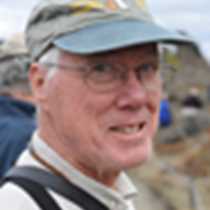Half Moon Island, the South Shetlands
We have crossed the Drake Passage, that notorious stretch of the Southern Ocean between the southern tip of South America and the Antarctic Peninsula, and we survived. We have crossed the Antarctic Convergence to enter the cold, productive waters that surround the southern continent. We have passed through 60º South Latitude, the political boundary of Antarctica. And now we have seen our first icebergs and visited our first penguins. We are Antarcticians!
In late morning our views of endless ocean swells changed to scenes of large, flat-topped tabular icebergs the size of a city block (in some cases they are the size of whole cities!) and of land – the volcanic islands that make up the South Shetland Archipelago. We passed through English Straits between Robert and Greenwich Islands, and then tucked into a bay on Livingston Island for our first Antarctic landing on Half Moon Island. It is home to a nesting colony of chinstrap penguins, which many find to be the noisiest and most quarrelsome of the Antarctic penguins. A greeting committee of chinstraps, and a few gentoos as well, awaited us as we stepped out of our Zodiacs onto a cobble beach. The gentoos were only visitors, but the chinstraps were attending their young, most of them two to three weeks old, on the slopes above. In fact, the nesting colony went as high as the island would allow. It was a wonderful time for us to simply sit and watch the workings of the colony, the comings and goings, and the squabbles between neighbors. Each nest had one or two gray downy young attended by an adult bird. It might be male or female. Both sexes participate, one guarding the young while the other is away gathering food for the hungry offspring, and then they switch duties. We watched the transfer of food from adult to young, with the chick sticking its head impossibly far into the open mouth of its parent. On the beach below the penguin colony a few Weddell seals rested on the snow, quite oblivious to our approach. Nesting Antarctic terns were anything but oblivious, taking to the wing and squawking raucously at any kelp gull, skua, or human that passed too close for the tern’s comfort. It took an effort to tear ourselves away from our first Antarctic landing, but we had to.
This is expedition travel: one moment we are clambering over rocks with the penguins, and twenty minutes later, after a hot shower, we gather in the comfortable lounge and the Captain is buying the drinks! Could it be any better?
We have crossed the Drake Passage, that notorious stretch of the Southern Ocean between the southern tip of South America and the Antarctic Peninsula, and we survived. We have crossed the Antarctic Convergence to enter the cold, productive waters that surround the southern continent. We have passed through 60º South Latitude, the political boundary of Antarctica. And now we have seen our first icebergs and visited our first penguins. We are Antarcticians!
In late morning our views of endless ocean swells changed to scenes of large, flat-topped tabular icebergs the size of a city block (in some cases they are the size of whole cities!) and of land – the volcanic islands that make up the South Shetland Archipelago. We passed through English Straits between Robert and Greenwich Islands, and then tucked into a bay on Livingston Island for our first Antarctic landing on Half Moon Island. It is home to a nesting colony of chinstrap penguins, which many find to be the noisiest and most quarrelsome of the Antarctic penguins. A greeting committee of chinstraps, and a few gentoos as well, awaited us as we stepped out of our Zodiacs onto a cobble beach. The gentoos were only visitors, but the chinstraps were attending their young, most of them two to three weeks old, on the slopes above. In fact, the nesting colony went as high as the island would allow. It was a wonderful time for us to simply sit and watch the workings of the colony, the comings and goings, and the squabbles between neighbors. Each nest had one or two gray downy young attended by an adult bird. It might be male or female. Both sexes participate, one guarding the young while the other is away gathering food for the hungry offspring, and then they switch duties. We watched the transfer of food from adult to young, with the chick sticking its head impossibly far into the open mouth of its parent. On the beach below the penguin colony a few Weddell seals rested on the snow, quite oblivious to our approach. Nesting Antarctic terns were anything but oblivious, taking to the wing and squawking raucously at any kelp gull, skua, or human that passed too close for the tern’s comfort. It took an effort to tear ourselves away from our first Antarctic landing, but we had to.
This is expedition travel: one moment we are clambering over rocks with the penguins, and twenty minutes later, after a hot shower, we gather in the comfortable lounge and the Captain is buying the drinks! Could it be any better?




